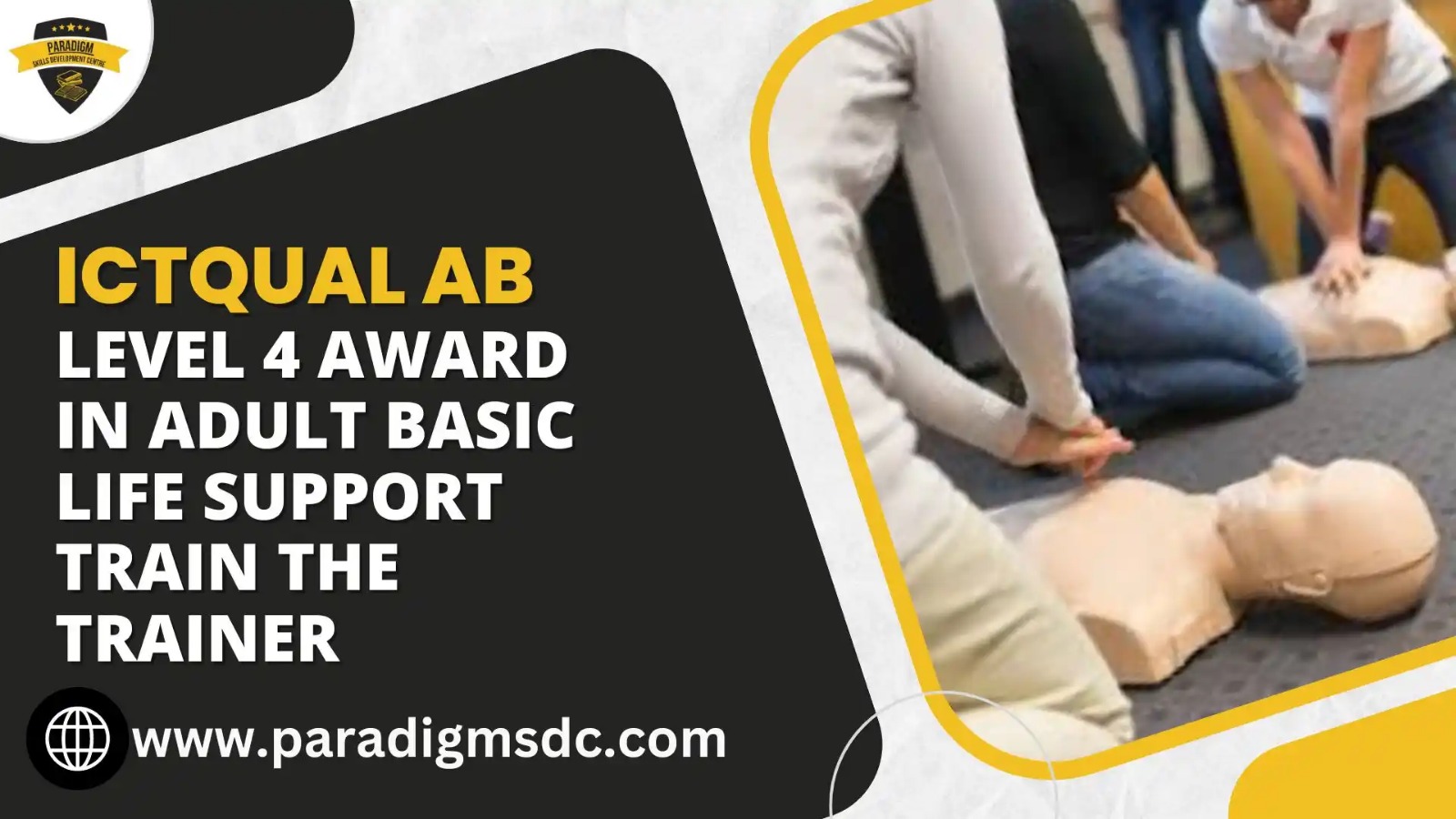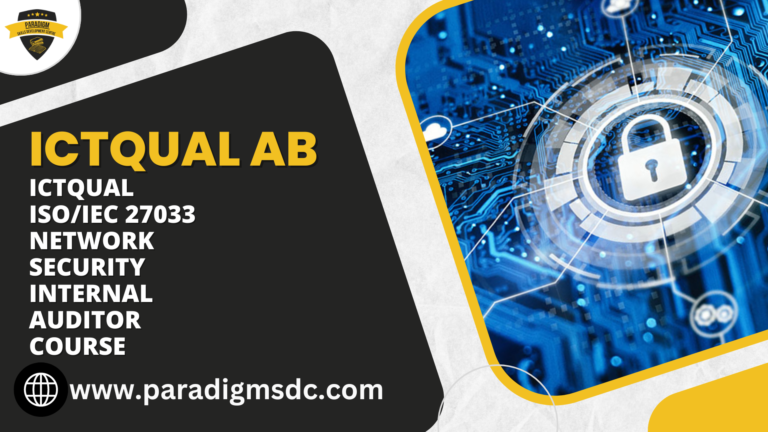Course Introduction
Basic Life Support (BLS) is a crucial skill that can mean the difference between life and death in emergency situations. The ICTQual Level 4 Award in Adult Basic Life Support Train the Trainer course is designed to equip professionals with the knowledge and skills to effectively teach BLS techniques. This program aims to create a network of proficient trainers who can disseminate life-saving skills widely, ensuring that more people are prepared to respond in critical moments.
Course Overview
The ICTQual Level 4 Award in Adult Basic Life Support Train the Trainer is a comprehensive program that covers all essential aspects of BLS. This course combines theoretical knowledge with hands-on practice, ensuring that participants can confidently train others in life-saving techniques. The curriculum includes modules on understanding BLS principles, performing CPR, using automated external defibrillators (AEDs), and managing choking incidents.
Course Study Units
- Foundations of Adult Basic Life Support (BLS) Training
- BLS Techniques and Protocols
- Assessment and Recognition of Life-Threatening Emergencies
- Airway Management and Choking Relief
- Automated External Defibrillator (AED) Use
- Effective Teaching and Training Strategies
- Assessment and Feedback
- Training Program Development and Delivery
- Legal and Ethical Considerations
- Continuous Professional Development
Learning Outcomes
Upon completion of the course, participants will be able to:
- Foundations of Adult Basic Life Support (BLS) Training
- Understand the fundamental principles and objectives of BLS training.
- Recognize the importance of prompt and effective BLS interventions in emergency medical care.
- Explain the physiological basis of cardiac arrest and other life-threatening emergencies.
- BLS Techniques and Protocols
- Demonstrate proficiency in performing BLS techniques such as chest compressions, rescue breathing, and AED use.
- Follow established protocols for initiating and coordinating BLS interventions.
- Apply knowledge of BLS techniques to effectively manage adult victims in cardiac arrest and other emergencies.
- Assessment and Recognition of Life-Threatening Emergencies
- Identify signs and symptoms of life-threatening conditions in adults, including cardiac arrest and respiratory distress.
- Conduct rapid and systematic assessments to determine the nature and severity of emergencies.
- Make timely and accurate decisions based on assessment findings to initiate appropriate BLS interventions.
- Airway Management and Choking Relief
- Demonstrate proficiency in opening the airway and providing effective rescue breaths to adult victims.
- Apply appropriate techniques for managing airway obstructions and relieving choking in adult victims.
- Recognize the importance of maintaining a clear airway in BLS interventions and emergency medical care.
- Automated External Defibrillator (AED) Use
- Operate an AED safely and effectively in accordance with established protocols.
- Recognize when and how to use an AED as part of BLS interventions.
- Deliver defibrillation shocks promptly and appropriately to adult victims in cardiac arrest.
- Effective Teaching and Training Strategies
- Apply principles of adult learning and instructional design to develop engaging and effective BLS training programs.
- Use a variety of teaching methods and strategies to facilitate learning and retention of BLS skills.
- Create a supportive and inclusive learning environment that encourages active participation and skill development.
- Assessment and Feedback
- Design assessment methods to evaluate learner competence in BLS techniques and protocols.
- Provide constructive feedback to learners to support their skill development and confidence.
- Monitor learner progress and address areas for improvement through targeted feedback and interventions.
- Training Program Development and Delivery
- Plan and organize BLS training programs, including curriculum development, scheduling, and logistics management.
- Deliver BLS training sessions effectively, adapting content and methods to meet the diverse needs of learners.
- Ensure that training programs meet relevant regulatory requirements and accreditation standards.
- Legal and Ethical Considerations
- Understand legal and ethical obligations related to BLS training, including liability issues, consent, and confidentiality.
- Adhere to professional standards and guidelines in the provision of BLS training.
- Ensure compliance with relevant regulations and standards to maintain the integrity and safety of BLS training programs.
- Continuous Professional Development
- Engage in ongoing learning and professional development activities to stay current with advancements in BLS techniques, protocols, and guidelines.
- Participate in refresher courses, continuing education opportunities, and skills practice sessions to maintain proficiency in BLS skills.
- Demonstrate a commitment to lifelong learning and continuous improvement as a BLS trainer.
Course Benefits
- Enhanced Knowledge: Gain a thorough understanding of adult BLS principles and techniques.
- Professional Development: Enhance your credentials and career prospects in healthcare and emergency response.
- Practical Skills: Acquire practical training skills that can be applied in various professional settings.
- Impactful Training: Learn to design and deliver training sessions that lead to significant improvements in emergency preparedness.
- Networking Opportunities: Connect with other professionals dedicated to emergency response and training.
Who is this Course For?
This course is ideal for:
- Healthcare professionals, including nurses, paramedics, and doctors.
- First responders and emergency medical technicians (EMTs).
- Trainers and educators in healthcare and emergency response.
- Safety officers and workplace emergency coordinators.
- Anyone committed to improving emergency preparedness and response in their community.
Future Progression
Upon completing the ICTQual Level 4 Award in Adult Basic Life Support Train the Trainer, participants can pursue further qualifications and career advancements, such as:
- Advanced certifications in emergency medical response and life support.
- Leadership roles in healthcare training and emergency preparedness.
- Opportunities to contribute to policy development and advocacy in emergency response.
- Specialized training roles in larger healthcare institutions or emergency response organizations.
Investing in the ICTQual Level 4 Award in Adult Basic Life Support Train the Trainer is a crucial step towards becoming a leader in life-saving education. By gaining the expertise to train others, you will help ensure that more people are equipped with the skills needed to respond effectively in emergencies, ultimately contributing to safer communities and better emergency outcomes.







